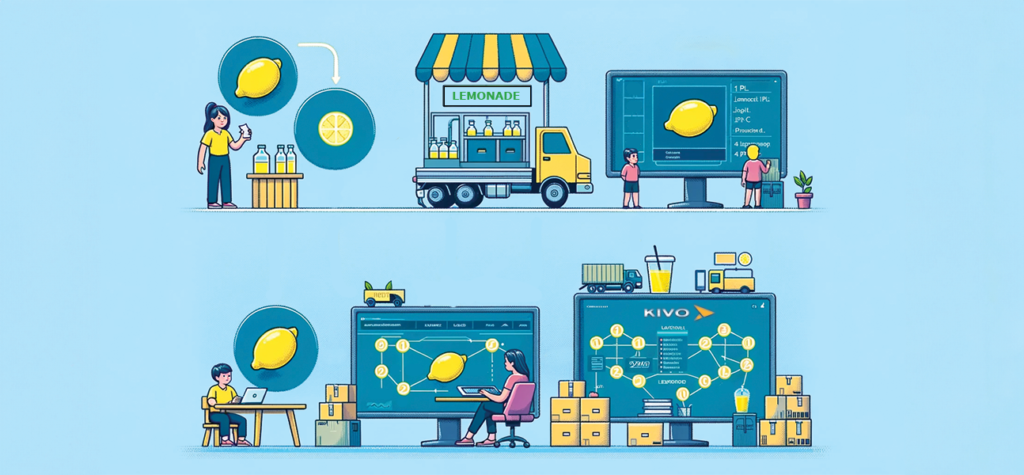In the complex arena of supply chain management, the distinctions between logistics provider models—from 1PL to 5PL—hold critical implications for businesses strategizing to refine their operations. Each model presents a unique set of functionalities tailored to diverse needs, ranging from straightforward shipments to all-encompassing, integrated supply chain solutions. This exploration seeks to delineate these differences comprehensively and to understand how Kivo BPO emerges as a strategic ally across this spectrum.
First-Party Logistics (1PL)
The foundation of logistics services begins with the 1PL model, where the production or distribution entity directly transmits goods to the retailer or consumer.
They are essentially the producers or manufacturers that control their logistics operations. This means they handle the transportation of their goods directly to the customer or retailer without engaging any third-party services. The operation is straightforward but may lack efficiency and scalability as the business grows.
On simpler terms, imagine you made lemonade and sold it directly from your front yard. You are doing everything yourself, from making the lemonade to handing it to your neighbors. That’s what a 1PL does with their products.
The Role of Kivo BPO
Although Kivo BPO does not operate within the 1PL framework, it offers strategic advisory services to assist these entities in scaling their operations or transitioning to more sophisticated logistics models to accommodate growth.
Second-Party Logistics (2PL)
Moving up the logistics ladder, 2PL providers, they are asset-based carriers that own the means of transportation. They can be shipping lines, airlines, or trucking companies that transport goods. However, they do not offer any additional logistics services beyond the physical movement of products.
For example, think of a truck driver who takes your lemonade from your house to a store. They have the truck and will drive there, but they won’t help you with anything else, like storing or selling your lemonade.
The Role of Kivo BPO
Kivo BPO extends the 2PL model’s capabilities by providing supplementary logistics services, including inventory management and order processing, thereby elevating the efficiency of transportation-focused operations.
Third-Party Logistics (3PL)
The 3PL model offer a more comprehensive suite of services than 2PLs, including warehousing, distribution, and fulfillment services. They can manage inventory, handle shipping and returns, and provide a link between manufacturers and retailers. This model is popular among businesses looking to outsource their logistics to focus on their core operations.
Following the example above, now, imagine a company that not only takes your lemonade to the store but also helps you store it in a cool place, keeps track of how much you’re selling, and even takes back unsold bottles. That’s a 3PL.
The Role of Kivo BPO
Kivo BPO enhances 3PL offerings through superior data analytics, customer service, and technological solutions, thereby bolstering operational efficiency and consumer satisfaction, fortifying the 3PL model’s adaptability and breadth.
Fourth-Party Logistics (4PL)
At the 4PL level, providers act as integrators, managing the entire supply chain. They do not own transportation assets but work with 3PLs and other providers and assume full management of the supply chain, synthesizing IT, procurement, financial planning, and logistics strategy. They focus on optimizing the supply chain for efficiency and cost-effectiveness.
Think of having a friend who’s really good at organizing. They tell you where to get the best lemons, which truck driver to use, and how to keep track of your sales. They make sure everything runs smoothly, but they don’t do any of the transporting or selling themselves. That’s a 4PL.
The Role of Kivo BPO
Kivo BPO aligns with 4PL entities by delivering specialized expertise in IT, financial strategizing, and consultancy, supporting the 4PL’s overarching role in supply chain orchestration.
Fifth-Party Logistics (5PL)
The apex of logistics integration is embodied by 5PL providers, that represent the most integrated model, coordinating entire supply chains through the use of multiple 3PLs and 4PLs. They leverage advanced technology to manage logistics operations, focusing on achieving economies of scale and maximizing efficiency across the entire network. This model is predicated on advanced IT systems for real-time oversight and coordination.
The Role of Kivo BPO
For 5PL operations, Kivo BPO offers indispensable support in IT integration, supply chain analytics, and strategic planning, ensuring fluidity across all logistics services. Our proficiency in emerging technologies and supply chain optimization positions us as an essential facilitator of 5PL solutions.
Now, imagine there’s a big company that plans out how to sell lemonade all over the country. They decide who will make the lemonade, who will transport it, and how to sell it efficiently. They use computers to make all these plans and to make sure everyone gets their lemonade on time. That’s a 5PL.
The difference between 1PL and 5PL lies in the complexity and scope of services offered. As we move from 1PL to 5PL, the role of the logistics provider transitions from direct, hands-on activities to more strategic, overarching management of the entire supply chain. Whether it’s selling lemonade or shipping products across the globe, understanding these models helps businesses choose the right logistics partner for their needs.
Kivo BPO is poised to partner with entities across this entire spectrum, providing customized solutions that drive efficiency, growth, and customer fulfillment. Regardless of your business’s size or the complexity of your logistics needs, Kivo BPO has the expertise to propel your supply chain strategy to new heights.
We invite you to reach out to us to discover how we can elevate your logistics operations, irrespective of your position within the 1PL to 5PL range, and to advance your supply chain management to its optimal potential
